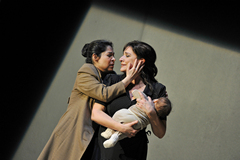| Opera Reviews | 2 May 2024 |
Bartoli's emotional Norma |
|
| Bellini: Norma Edinburgh International Festival August 2016 |
|
|
The action takes place in a school building, all high ceilings and tall, shuttered windows, painted a shabby ‘school cream’. Cecilia Bartoli, in a ravishing performance, is a druidic priestess and seer and, as such, deferred to by the resistance fighters as to when they should attack the occupying oppressors. Only, she secretly has two children by the local commander, Pollione, an impressive John Osborn. He has ‘moved on’ and has seduced Adalgisa, a younger priestess, and is planning to take her with him when he shortly returns to Rome. In one of the tenderer parts of the opera, Rebeca Olvera confesses to Norma how she met and fell for Pollione, which exactly parallels the older woman’s experience; there is a charmingly tetchy ‘You’re not listening to me’ from Adalgisa, as Norma zones out into reminiscence. The voices are well matched, Olvera’s bright and animated against Bartoli’s, quieter and brimming with nostalgia. Peter Kálmán’s Oroveso seems hardly old enough to be Norma’s father. He is forthright, as he should be, clearly a leader and yet deferring to his daughter. His final confrontation with Norma, when she pleads with him to take care of her children, is full of anguish on both sides. The Swiss Radio and Television Chorus are rather sotto voce, as if privately commenting on the action. They are moved round Christian Fenouillet’s rather cluttered set, and the declaration of war, when they link arms and rush the front of the stage, is full of menace. On the other hand, Christophe Forey’s lighting is rather static – for instance, in the Act 2 overture, when Norma sits in the light of early dawn with her grief, a bottle and a kitchen knife, it does not grow brighter. Or is it meant to indicate that time stood still? Chorusmaster Gianluca Capuano conducts in place of the indisposed Diego Fasoli. I Barocchisti play Bellini’s romantic music lightly; the music skips along, with snippets of martial music here, a hymn-tune there enough to create atmosphere. When the resistance has captured Pollione and ties him to a chair, will Norma seek vengeance and shop her rival? Having been unable to kill her children, she finds herself confessing that she has broken her vows. The clutter of furniture now comes into its own as it is piled round the lovers. Finally, the searing flames in the torched school correspond to the emotions of Bartoli’s and Osborn’s final moments.
|
|
| Text ©
Catriona Graham Photo © Hans-Jörg Michel |

 Allo, Allo, are these coal-scuttle helmets I see? Indeed. Norma, Bellini’s opera of the Gallic wars has been brought forward to 1940s, in this Salzburg Festival production now being performed at the Edinburgh International Festival.
Allo, Allo, are these coal-scuttle helmets I see? Indeed. Norma, Bellini’s opera of the Gallic wars has been brought forward to 1940s, in this Salzburg Festival production now being performed at the Edinburgh International Festival.






